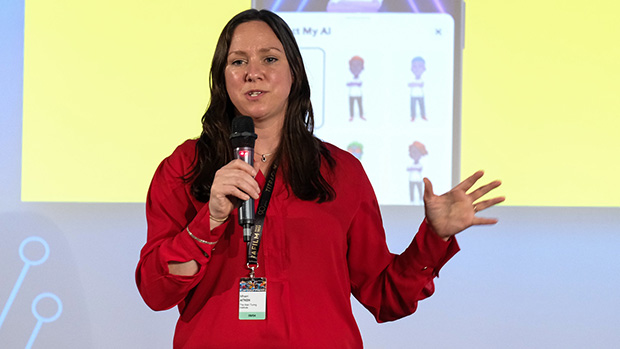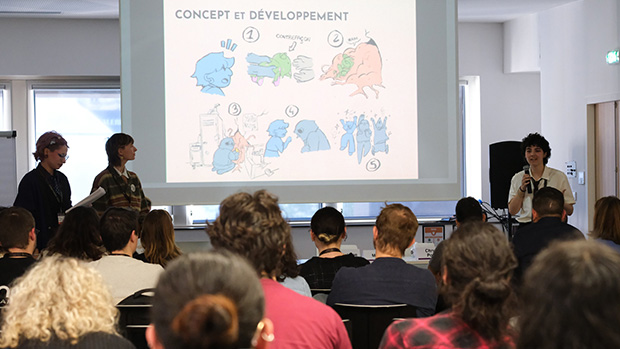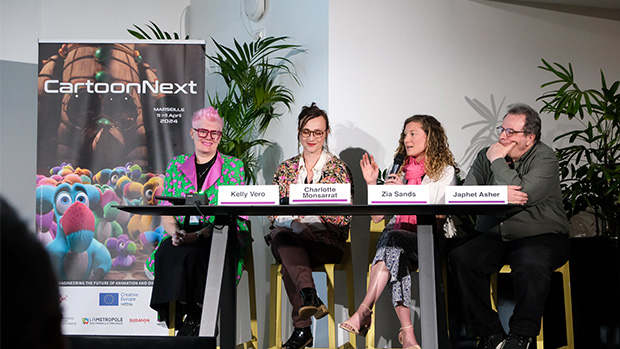'Shoots of positivity' at Cartoon Next
By Karolina Kaminska
23-04-2024
Producers, broadcasters, analysts and students gathered in Marseille earlier this month for Cartoon Next, where they discussed the latest trends and what lies ahead for the animation sector.

The Alan Turing Institute’s Dr Mhairi Aitken discussed the benefits AI
Cartoon Next, an animation event organised by Belgian company Cartoon, returned to the French city of Marseille earlier this month for its third year.
Welcoming 229 participants from 18 countries, including producers, broadcasters and students, the conference featured a mix of panel sessions, keynotes, case studies and pitching sessions aiming to look at what’s next in the world of animation.
Hosting one of the keynotes was Alex Cameron, director for EMEA at research firm Parrot Analytics, who highlighted adult animation as a growth area in the sector.
“The appetite for adult animation continues to grow. This genre is no longer just a niche and is becoming a dominant force in global entertainment. We should expect to see a surge of investment targeting those younger audiences who crave slightly more complex and culturally relevant narratives, as we’ve seen with anime,” Cameron said.

Cartoon Next featured a mix of panel sessions, keynotes, case studies and pitching sessions
A particular opportunity lies in adult animation aimed at females, according to the analyst, as streamers and broadcasters are looking for a more even gender split – but most existing adult animated series are skewed towards males.
Cameron also used his presentation to call attention to the “shoots of positivity” he said there are in the animation sector, which is grappling with ongoing funding issues, commissioning freezes and the cancellation of many animated projects by the big streamers.
“There are shoots of positivity. There are shoots of life. I spend a lot of time talking to streamers, to local broadcasters, to private equity funds, and things are starting to brighten up. Projects are being greenlit and the clouds are starting to part,” he said.
The overall atmosphere at Cartoon Next was indeed positive and optimistic of a bright future, with producers and broadcasters chatting excitedly about upcoming projects. The consensus among those C21 spoke to, however, was that there are still tough times ahead.
“‘Survive to 25’ is what they’re saying, but it’s probably ‘survive to 26,’ in all likelihood. The industry is haemorrhaging money and yet the competition has never been greater, because Covid allowed for strong development to happen and those projects are now being pitched,” said John Rice, CEO of Irish studio Jam Media.

The event organised by Belgian company Cartoon celebrated its its third anniversary
Japhet Asher, director of cross-tech IP creation and consulting company Polarity Reversal, added: “I don’t think ‘survive to 25’ is a safe idea, because I don’t think most places will survive until 25 if they’re not adapting and thinking differently about the content they make and their audience.
“People hope money will come back into the system and we’ll all go back to making 13 episodes of this for that channel, but it’s not going to be like that. Money may come back, good times may return to the economy, but that doesn’t solve the issue of the changing audience and the changing technologies to reach the audience. So you have to be learning and evolving. And if you’re in a time of retrenchment, this is a time to learn new skills.”
Chrystel Poncet, who spent 25 years in broadcasting before founding French studio MaGic C, criticised the streamers for not taking animation “seriously.”
“We had so much hope from the big streamers because we thought they could be the new voice, the place where animation could be a medium where you could tell every story you want for every audience. It was the case at the very beginning but then they decided to cut their investment and now we are going back to the linear channels. We thought there could have been more commissioning, and some companies grew a lot [in response], but because of the cuts, they have to reduce [in size] again,” she said.
Another hot topic in Marseille was artificial intelligence (AI) and how it will continue to influence the animation industry. Conversely to this time last year, when many people working in animation were afraid to talk or even think about the effects and risks AI could pose, discussions around and experiments with the new technology are now commonplace.
In her keynote at Cartoon Next, Dr Mhairi Aitken, ethics fellow at The Alan Turing Institute, discussed the benefits AI could bring to children and children’s media, as well as the risks, when formulating policy and governance.
Taking part on a panel session closing the event, Warner Bros Discovery (WBD) in EMEA’s lead for acquisitions, partnerships and coproductions for kids and family, Zia Sands, spoke about the company’s stance on commissioning content that has used AI.
Sands said WBD has no issue with the use of AI in crafting development materials, such as proof of concept and mood boards, but that the company would not necessarily use AI to make the series itself.
“At that point, that would be something we would need to escalate up the chain, to see where we stand. Because as a company right now, we are not actively utilising AI. We want to protect artists. We want to protect the craft of animation. We think that is really important,” she said.
READ LESSProducers, broadcasters, analysts and students gathered in Marseille earlier this month for Cartoon Next, where they discussed the latest trends and what lies ahead for the animation sector.

The Alan Turing Institute’s Dr Mhairi Aitken discussed the benefits AI
Cartoon Next, an animation event organised by Belgian company Cartoon, returned to the French city of Marseille earlier this month for its third year.
Welcoming 229 participants from 18 countries, including producers, broadcasters and students, the conference featured a mix of panel sessions, keynotes, case studies and pitching sessions aiming to look at what’s next in the world of animation.
Hosting one of the keynotes was Alex Cameron, director for EMEA at research firm Parrot Analytics, who highlighted adult animation as a growth area in the sector.
“The appetite for adult animation continues to grow. This genre is no longer just a niche and is becoming a dominant force in global entertainment. We should expect to see a surge of investment targeting those younger audiences who crave slightly more complex and culturally relevant narratives, as we’ve seen with anime,” Cameron said.

Cartoon Next featured a mix of panel sessions, keynotes, case studies and pitching sessions
A particular opportunity lies in adult animation aimed at females, according to the analyst, as streamers and broadcasters are looking for a more even gender split – but most existing adult animated series are skewed towards males.
Cameron also used his presentation to call attention to the “shoots of positivity” he said there are in the animation sector, which is grappling with ongoing funding issues, commissioning freezes and the cancellation of many animated projects by the big streamers.
“There are shoots of positivity. There are shoots of life. I spend a lot of time talking to streamers, to local broadcasters, to private equity funds, and things are starting to brighten up. Projects are being greenlit and the clouds are starting to part,” he said.
The overall atmosphere at Cartoon Next was indeed positive and optimistic of a bright future, with producers and broadcasters chatting excitedly about upcoming projects. The consensus among those C21 spoke to, however, was that there are still tough times ahead.
“‘Survive to 25’ is what they’re saying, but it’s probably ‘survive to 26,’ in all likelihood. The industry is haemorrhaging money and yet the competition has never been greater, because Covid allowed for strong development to happen and those projects are now being pitched,” said John Rice, CEO of Irish studio Jam Media.

The event organised by Belgian company Cartoon celebrated its its third anniversary
Japhet Asher, director of cross-tech IP creation and consulting company Polarity Reversal, added: “I don’t think ‘survive to 25’ is a safe idea, because I don’t think most places will survive until 25 if they’re not adapting and thinking differently about the content they make and their audience.
“People hope money will come back into the system and we’ll all go back to making 13 episodes of this for that channel, but it’s not going to be like that. Money may come back, good times may return to the economy, but that doesn’t solve the issue of the changing audience and the changing technologies to reach the audience. So you have to be learning and evolving. And if you’re in a time of retrenchment, this is a time to learn new skills.”
Chrystel Poncet, who spent 25 years in broadcasting before founding French studio MaGic C, criticised the streamers for not taking animation “seriously.”
“We had so much hope from the big streamers because we thought they could be the new voice, the place where animation could be a medium where you could tell every story you want for every audience. It was the case at the very beginning but then they decided to cut their investment and now we are going back to the linear channels. We thought there could have been more commissioning, and some companies grew a lot [in response], but because of the cuts, they have to reduce [in size] again,” she said.
Another hot topic in Marseille was artificial intelligence (AI) and how it will continue to influence the animation industry. Conversely to this time last year, when many people working in animation were afraid to talk or even think about the effects and risks AI could pose, discussions around and experiments with the new technology are now commonplace.
In her keynote at Cartoon Next, Dr Mhairi Aitken, ethics fellow at The Alan Turing Institute, discussed the benefits AI could bring to children and children’s media, as well as the risks, when formulating policy and governance.
Taking part on a panel session closing the event, Warner Bros Discovery (WBD) in EMEA’s lead for acquisitions, partnerships and coproductions for kids and family, Zia Sands, spoke about the company’s stance on commissioning content that has used AI.
Sands said WBD has no issue with the use of AI in crafting development materials, such as proof of concept and mood boards, but that the company would not necessarily use AI to make the series itself.
“At that point, that would be something we would need to escalate up the chain, to see where we stand. Because as a company right now, we are not actively utilising AI. We want to protect artists. We want to protect the craft of animation. We think that is really important,” she said.














.jpg)




























